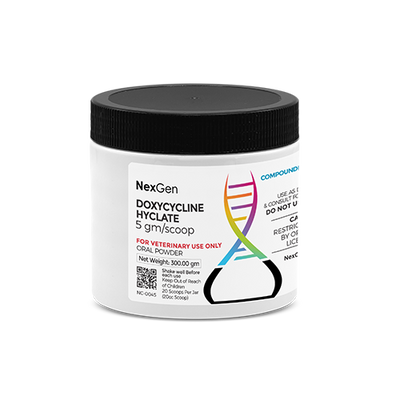
Fenbendazole 10 gm/scoop, Oral Powder, 20 Scoops (20cc Scoop)
Login for pricing
- Brand
- Mixlab
- SKU:
- NC-0539
- Product Type:
- Powder
- Size:
- 32oz
- Administration:
- Oral
- Scoops Per Container:
- 20
- Scoop Size:
- 20cc
The threat of parasites and worms are a reality for large, small and exotic animals. These are also among the most common issues that are routinely addressed in veterinary practices. Typically affecting breeds and pets that have access to the outdoors, some species may also harbor worms, encysted worm eggs or worm larvae when they are acquired.
Parasites and worms can cause ailments like stomach upset in minor cases, all the way up to death in extreme cases. The most common type of parasites that affect pet dogs and cats are hookworms, whipworms, roundworms, and tapeworms.1,2Worm infestations are also regularly reported in horses, cattle and a wide variety of exotic companion animals. In less-developed nations, parasitic worms infect millions of people and animals, and influence how the immune system responds to diseases like HIV and tuberculosis.1
The effects of worms may appear insidious or elusive, since they can lay dormant in an animal’s body for quite some time before physical symptoms manifest. If a pet is experiencing rapid and random weight loss, diarrhea, anemia, scratching of the perianal area, unexplained vomiting, severe bad breath or severe coughing, then veterinary intervention should be considered, as it is a very real possibility that the animal is experiencing some sort of parasitic infestation.
Exotic animal species are also becoming more and more common among pet enthusiasts and on properties that are being managed for recreational or commercial hunting. In the former, the stress of captivity coupled with a closed environment can lead to potentially heavy burdens of parasites with direct life cycles.2 Some exotic species (e.g., reptiles, ferrets, birds) may also be more likely to be acquired with worms or worm eggs; appearing healthy upon acquisition, they may later present with the symptoms of a worm infestation.
The method of transmission of worms to an animal is typically determined by the life cycle of the worm species involved. In most cases, worm eggs are inadvertently ingested and develop inside the digestive tract or lungs, where they may or may not cause disease. Eggs produced by adult worms are then shed in the animal’s feces where they can potentially infect humans or other animals.
Fenbendazole Powder for the Treatment of Worms
Fenbendazole is a broad spectrum methylcarbamate benzimidazole anthelmintic that is used for the treatment of nematode and protozoal parasites in many species.
- In dogs, fenbendazole is labeled for removal of roundworms (Toxocara canis, Toxascaris leonina), hookworms (Ancylostoma caninum, Uncinaria stenocephala), whipworms (Trichuris vulpis), and tapeworms (Taenia pisiformis).
- In horses, fenbendazole is labeled for the removal of large strongyles (Strongylus edentatus, S equinus, S vulgaris, Triodontophorus spp), small strongyles (Cyathostomum spp, Cylicocyclus spp, Cylicostephanus spp, Cylicodontophorus spp), ascarids (Parascaris equorum) and pinworms (Oxyuris equi). Benzimidazole resistance has been noted in Cyathostomum spp found in the United States.
- In cattle, fenbendazole is labeled for removal of Haemonchus contortus, Ostertagia ostertagi, Trichostrongylus axei, Bunostomum phlebotomum, Nematodirus helvetianus, Cooperia spp, Trichostrongylus colubriformis, Oesophagostomum radiatum, and Dictyocaulus viviparus.
- In nonlactating goats, fenbendazole is labeled for removal of adult stomach worms (H contortus, Teladorsagia circumcincta).
- In swine, fenbendazole is labeled for removal of large roundworms (Ascaris suum), lungworms (Metastrongylus apri, Metastrongylus pudendotectus), nodular worms (Oesophagostomum dentatum, Oesophagostomum quadrispinulatum), small stomach worms (Hyostrongylus rubidus), whipworms (Trichuris suis) and kidney worms (Stephanurus dentatus; both mature and immature).
- Fenbendazole is approved for the control of ascarids in big cats (e.g., lions, leopards, tigers) and in bears. In some of these species, it is also labeled for control of hookworms and/or tapeworms.
- Fenbendazole has also been used extra-label in domestic cats, sheep, camelids, small mammals, pet birds, and reptiles. It may be approved in countries outside the United States for these species.4
Fenbendazole’s mechanism of action is believed to involve the disruption of intracellular microtubular transport systems by binding selectively and damaging tubulin, which prevents tubulin polymerization and inhibits microtubule formation. Fenbendazole has activity against adult life cycle stages of susceptible parasites and may have larvicidal and ovicidal activity against certain parasites.5-7
Where to buy Fenbendazole
This product carries numerous potential drug interactions. Please consult your veterinarian prior to beginning any treatment regimen.
FOR RX ONLY: A valid prescription from a licensed veterinarian is required for dispensing this medication.
4Plumb’s Veterinary Drugs.
5Mason ME, Voris ND, Ortis HA, Geeding AA, Kaplan RM. Comparison of a single dose of moxidectin and a five-day course of fenbendazole to reduce and suppress cyathostomin fecal egg counts in a herd of embryo transfer-recipient mares. J Am Vet Med Assoc. 2014;245(8):944-951.
6Daniels SP, Proudman CJ. Ovicidal efficacy of fenbendazole after treatment of horses naturally infected with cyathostomins. Vet Parasitol. 2016;227:151-156.
7Pittman JS, Myers GH, Stalder KJ, Karriker LA. Effect of fenbendazole on shedding and embryonation of Ascaris suum eggs from naturally infected sows. J Swine Health Production. 2015;23(5):252-263.













